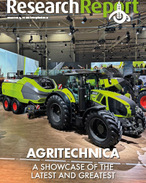This article is 4 years old. Images might not display.
With global and Australian canola prices breaking records, the report says Australia's canola industry has more potential upside ahead with policies to curb emissions in North America and Europe expected to lift global demand for oilseeds, and in particular canola, through to 2030.
The report, ‘Global Canola Opportunities in the Sustainable Fuel Future: Is Australia fit and ready?', says over the next decade, government initiatives to curb emissions in the northern hemisphere will fundamentally change, and be the key drivers of, the global canola market.
"This will present opportunities for Australian canola exports," said the report co-author, Rabobank agriculture analyst, Dennis Voznesenski.
"In our base case outlook, these are modest initially, but grow as a result of structural shifts in the global industry in 2024/25 due to Canada's falling exportable surplus and then again from 2026/27 onward due to the European Union's increasing canola import needs," Voznesenski said.
Global supply of canola in the current 2021/22 season has been severely reduced by drought in Canada, the world's largest canola exporter, and by continued heavy European Union import demand.
And this has been benefiting Australia and other exporters, the report says.
Canola prices domestically are edging towards the A$1000 a tonne mark while overseas markets already broke through that level earlier in the year.
A substantial lift in global canola production is expected next season (2022/23).
"However, in 2024/25, we expect new Canadian crushing capacity to come online to supply a growing renewable diesel sector across North America and this will reduce Canada's exportable surplus, primarily to price-sensitive markets in Asia and Mexico, but also to Europe," Voznesenski said.
Canada typically produces close to 30 per cent of the world's canola and accounts for around 64 per cent of global exports.
"Then from 2026/27 onwards, we expect sizeable reductions in the EU's use of palm oil as a feedstock for biodiesel as it is phased out to meet sustainability commitments.
"The feedstock gap created will deliver an opportunity for even greater use of canola in the EU. Even under favourable European growing conditions, we could see EU import demand for canola then rise to levels similar to those of recent drought years."























